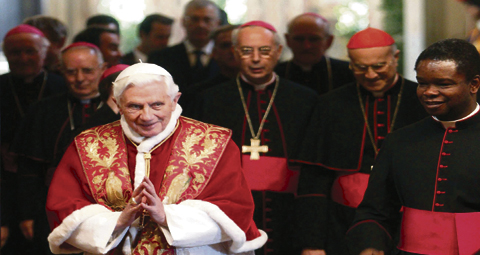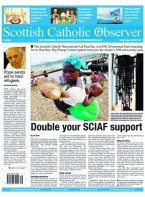BY Martin Dunlop | January 13 2012 | ![]() 0 COMMENTS
0 COMMENTS ![]() print
print

Call for Faith, hope and charity
Publication Date: 2012-01-13
— Holy Father tells diplomats of need for religious freedom, protection of family and financial responsibility
Pope Benedict XVI has spoken about the importance of religious freedom, the protection of family values and the crippling effects of the global financial crisis, during a speech to Vatican diplomats.
Speaking on Monday at his annual ‘State of the World’ address to members of the Diplomatic Corps accredited to the Holy See, the Holy Father expressed his deep concern for what he called ‘a profound disquiet’ that is darkening the world at this moment in time.
Religious freedom
In his address, the Pope described religious freedom as ‘the first of human rights, for it expresses the most fundamental reality of the person.’
He highlighted that in many countries, Christians are ‘deprived of fundamental rights, sidelined from public life and even violently attacked and forced to leave their homes.’
He remembered the ‘numerous victims’ of religiously motivated terrorism and said that these acts were especially prevalent last year in Asia and Africa, citing violence in Pakistan and Nigeria.
An explosion on Christmas Day ripped through a Catholic church near Nigeria’s capital, Abuja, killing more than 30 people, while, last Spring, Pakistan’s sole Christian government minister, Shahbaz Bhatti, was assassinated.
“On the continent of Africa… it is essential that co-operation between Christian communities and governments favour progress along the path of justice, peace and reconciliation, where respect is shown for members of all ethnic groups and all religions,” the Pope said to representatives from the 179 nations that the Vatican has diplomatic relations with.
The Pope also expressed hope that there would be an end to bloodshed in Syria and a speedy start to political dialogue with the presence of independent observers.
“I pray for a rapid end to the bloodshed and the beginning of a fruitful dialogue between the political forces, encouraged by the presence of independent observers,” he said.
Speaking of the Arab Spring movement, the Holy Father said that ‘young people, fearful of an uncertain future, have launched what has developed into a vast movement calling for reforms and more share in political and social life.’
“I invite the international community to dialogue with the actors in the current process and to contribute to the building of stable and reconciled societies that are opposed to every form of unjust discrimination,” the Pope said.
In reference to the Holy Land, ‘where tensions between Palestinians and Israelis affect the stability of the entire Middle East,’ the Pope said ‘it is necessary that the leaders of these two peoples adopt courageous and farsighted decisions in favour of peace,’ while he added that he was pleased to learn ‘that following an initiative of the Kingdom of Jordan, dialogue has been resumed.’
Youth and family
The Holy Father spoke in his address about the ‘pivotal role’ played by young people in society and underlined the need for solid educational institutions.
The Pope said that family creates a fundamental ‘setting’ for education and said there is ‘a need for policies which promote the family and aid social cohesion and dialogue.’
He warned, however, that there are several threats to the traditional family— particularly the clamour for same-sex ‘marriage’—that undermined ‘the future of humanity itself.’
The Pope said that ‘pride of place goes to the family, based on the marriage of a man and a woman.’
“This is not a simple social convention, but rather the fundamental cell of every society,” the Holy Father said. “Consequently, policies which undermine the family threaten human dignity and the future of humanity itself.
“The family unit is fundamental for the educational process and for the development both of individuals and states; hence there is a need for policies which promote the family and aid social cohesion and dialogue.”
Financial crisis
During his speech on Monday, the Pope also referred to the ‘grave and disturbing developments of the global economic and financial crisis.’
He said that those affected ‘include not only the families and businesses of economically advanced nations, but also those in developing countries.’
The Pope acknowledged that the crisis has bred, especially among younger generations, ‘frustration and fear of the future.’
He added that the crisis can and must be an incentive to reflect on human existence and on the importance of its ethical dimension.
Reaction
Speaking after the Holy Father’s address, Nigel Baker, the UK Ambassador to the Holy See, said that the message may have been sombre but it was neither gloomy nor pessimistic.
Ambassador Baker said that what he saw as the overall message of the address was not to ‘let the short-term crisis deter you from the important long-term policy goals and objectives.’
“His Holiness was very clear that we should not despair in this moment of crisis but that we need to look forward with new commitment, new dialogue, new creativity for ourselves and for the younger generations,” he said.
Chawki Armali, the representative of the Palestinian Liberation Organisation, gave a positive reaction to the Holy Father’s comments about the renewed Jordan-brokered peace talks between Israelis and
Palestinians.
“He was very [hopeful] that these negotiations could go again so that all the parties will have their rights and their right to have their own state,” Mr Armali said, while Mordechay Lewy, Israel’s ambassador, said that he felt the Holy Father ‘saw the light in the window and he encouraged the lights to be stronger.’
“And I think that’s very much welcomed by us,” he said.











